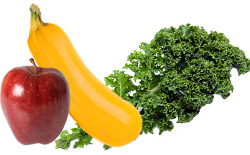What Can Vegans Eat?

What can vegans eat? Vegans can’t eat food made from animals or fish or sea animals. Vegans can eat whats grows from the earth and what grows waters like the ocean. Vegans eat food nature supplies us but we often overlook them because we may think they are inferior.
We have been programmed to think about meat, meat, meat, and are often not taught that it is the food of vegans that really sustain us and support our health. We have become less concerned about being healthy and we just want to eat that overly satisfy our taste buds.
I can only hope for the times comes when we are so conscious or our environment and are eating so healthy that the question doesn’t even come to mind: “What can vegans eat?” Vegan eat a plant-based diet, but the approach can be different depending if you are an ethical vegan or a dietary, or both.
Ethical vegans don’t eat anything that comes from animals and fish and don’t use any animal products like leather shoes, because they believe it is partaking in animal cruelty. Dietary vegans don’t eat animals, fish and sea animals, out of the belief that a plant-based diet best support our healthy living, and to avoid being cruel to animals.
The approach of the vegan influences what the vegan will eat. If you are just mainly concerned about not being cruel to animals you may not pursue the healthiest vegan diet. If you are a dietary vegan it is likely you will be concerned with eating a healthy vegan diet.
What can vegans eat? The short answer is a plant-based diet. What should vegans eat? The long answer is a whole food plant-based diet.
There are vegans who eat a plant-based diet, but their food choices are not the healthiest. They eat processed foods which undermine their healthy living. Junk foods like potato chips, soda, processed breads, pastries, cakes, and highly processed pasta, contain food additives and preservatives that are harmful to the body.
They can contain high levels of chemically processed sugar like high fructose corn syrup which is toxic to the body. They can also contain high levels of hydrogenated oil the is harmful to cardiovascular health, and phosphate additives that contribute to heart disease.
A whole food vegan plant-based diet supports healthy living in contrast to eating vegan junk food. This vegan shopping list includes a wide variety vegan whole foods the support healthy living and homeostasis.
Homeostasis is a state where all of the organs and functions in the body a operate most effectively. This nutritional guide explains more in depth “what can vegans eat,” and how to best approach adopt a plant-based diet to support healthy living.
These are the categories of vegan whole food, how each effects the body, and the proportions we should eat to best support healthy living. The proportions are also illustrated in this vegan food pyramid.
Fruits & Vegetables
 Fruits and vegetables should be the staple of the diet. Naturally, they are the foods that are most easily available. You walk up to a tree or plant and pick some fruit or leaves and start eating. Fruits and vegetables are the foods most concentrated with micronutrients, which include vitamins, minerals, and phytonutrients. These micronutrients support organ health and repair, and fight disease in the body. Fruits and vegetables are also loaded with carbohydrates that are the best source of energy for the body. They are quick burning so they provide us with quick energy. Since they burn quickly there is also less chance they will be stored in the body and contribute to weight gain. A diet consisting of 80% carbohydrates from fruits & vegetables keeps the body energized and full of nutrients to fight off disease.
Fruits and vegetables should be the staple of the diet. Naturally, they are the foods that are most easily available. You walk up to a tree or plant and pick some fruit or leaves and start eating. Fruits and vegetables are the foods most concentrated with micronutrients, which include vitamins, minerals, and phytonutrients. These micronutrients support organ health and repair, and fight disease in the body. Fruits and vegetables are also loaded with carbohydrates that are the best source of energy for the body. They are quick burning so they provide us with quick energy. Since they burn quickly there is also less chance they will be stored in the body and contribute to weight gain. A diet consisting of 80% carbohydrates from fruits & vegetables keeps the body energized and full of nutrients to fight off disease.
Tags: Things Vegans Can Eat, Vegan Recipes






